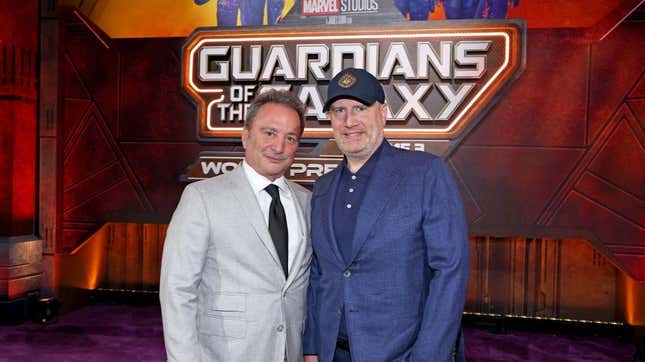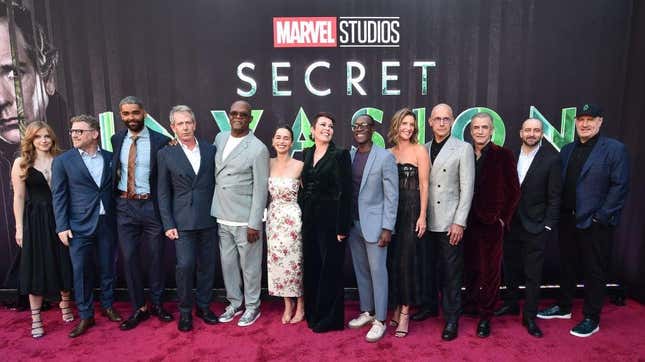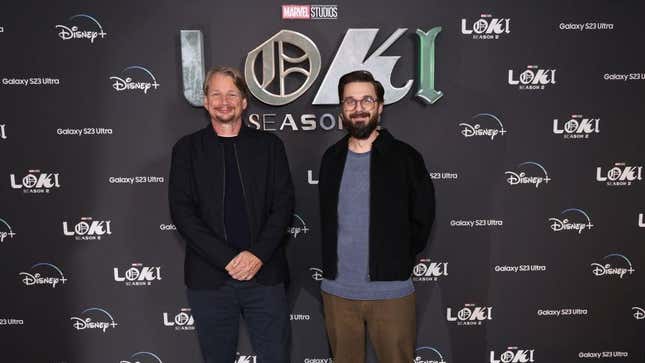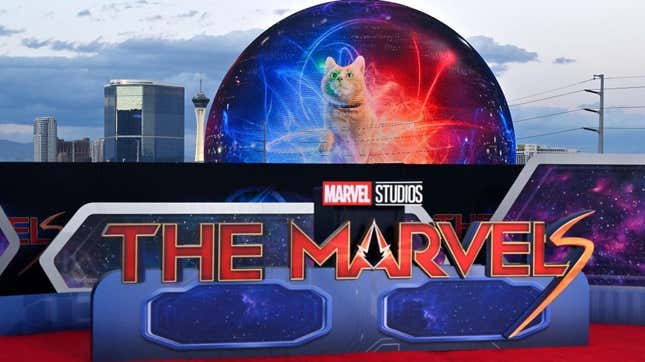This year, the once-untouchable Marvel Studios finally showed some vulnerability. For 15 years, the studio behind some of the biggest and best superhero movies ever was all but invincible. Every single gamble paid off. Every story expertly seeded over a decade blossomed beautifully. And even in the less cohesive few years after Avengers: Endgame, when the studio was releasing all manner of seemingly unrelated, superfluous shows and movies, it all seemed to work out.
Not so much in 2023—which saw Marvel Studios’ first certified box office bomb, as well as problems unfolding behind the scenes, in courtrooms, and most distressingly, in front of our very eyes. What happened? Why did it happen? Let’s relive the story of Marvel’s shockingly sour 2023.
January 2023: A worthy competitor?
As 2023 began, Marvel was still riding high. The previous year brought three shows that weren’t exactly smash hits, but were mostly well-received: Moon Knight, Ms. Marvel, and She-Hulk. In theaters, Doctor Strange 2 was a massive hit, and while Thor: Love and Thunder showed a few warning signs of the future, Black Panther: Wakanda Forever wiped those away.
The future was looking promising too. Three new shows and three new movies were coming, including arguably the most highly anticipated film since Endgame, Guardians of the Galaxy Vol. 3. But even that surefire success had an asterisk. The film’s writer and director, James Gunn, had left Marvel Studios to run DC Studios. One of Marvel’s own was going to be the leader of the main competitor.
And, in early January, Gunn, along with partner Peter Safran, released a multi-year plan detailing everything DC had in store for the future. It was the kind of massive, ambitious, exciting announcement Marvel had become well-known for and while it didn’t directly impact the studio, it set the tone for a very unexpected year.
February: Quantu (less-than) mania
February brought the release of Ant-Man and the Wasp: Quantumania, the first film of Marvel Studios’ Phase Five, its latest multi-film arc that would ultimately culminate in a massive, Avengers-like team-up movie. The film opened fairly well but the reviews were scathing, resulting in only the studio’s second Rotten score on Rotten Tomatoes. That lack of excitement and praise resulted in the effects-heavy film grossing less than the previous Ant-Man films, which was very unexpected.
Quantumania was also the first full-on starring role for Jonathan Majors as Kang, the villain earmarked to be the new Thanos. After debuting in Loki, Kang was set to appear multiple times leading to his being a major threat at the center of two upcoming Avengers films. The end credit scene even specifically teased that. It’s the type of thing that had always worked out for Marvel. Surely, it wouldn’t become an issue this time.
March: Major(s) problems begin
With reactions to Ant-Man and the Wasp: Quantumania leaving Marvel, and its fans, in a bit of an awkward spot, things got much sadder and more complicated in March. First up, Majors, the actor who was set to spearhead the entire MCU going ahead, was arrested in New York on assault charges brought by his former girlfriend. A guilty verdict on certain charges was returned nine months later, and it didn’t take long for Marvel to announce it had parted ways with him. As it stands, the person once thought to be a beacon of hope for the future is no longer that.
Also in March, one of Marvel’s most influential and powerful executives left the company: Victoria Alonso. She, along with Kevin Feige and Louis D’Esposito, had been behind every single Marvel hit in the past 15 years. Her departure from Marvel Studios left a ton of questions behind. Was she forced out? Why would she leave? Rumors suggested it had to do with Alonso’s oversight of visual effects in the films but, whatever the case, Marvel had lost one of its pillars.

May: Back to normal?
After a rough start to 2023, Marvel Studios looked to get back on track in early May. It released James Gunn’s Guardians of the Galaxy Vol. 3, which didn’t just score with critics, it had box office success too. This was the Marvel fans loved. This was a movie Marvel could be proud of. But little did everyone know that it was all downhill from here.
Summer: Strikes! Delays! Problems!
As Guardians of the Galaxy Vol. 3 was raking in money at the box office, the Writer’s Guild of America went on strike. With no writers to work on all of the upcoming titles Marvel Studios had promised for the next several years, the delays began. Films like Blade, which was still being written, were paused. Films set to start filming, like Thunderbolts, had to stop without writers to help punch up the scripts. Then, in July, when the actors joined the writers on strike, anything that was still going—like Deadpool 3—had to stop too.
For fans, a big blow was when Marvel Studios (along with basically every other studio) announced it would not be presenting at San Diego Comic-Con. Comic-Con is where Marvel Studios traditionally takes a victory lap each year and also teases fans about what’s to come. It’s the most sought-after presentation in Hall H. But with the strikes underway, the company didn’t know what, if anything, it could announce.
In addition, Disney’s CEO Bob Iger, boss of Marvel Studios president Kevin Feige, emerged as one of the most vocal executives against the strikes, making anything and everything associated with Disney just look bad. Plus, he later suggested that some of Disney’s brands (including Marvel) were releasing too much content. Surely, that couldn’t become super duper obvious anytime soon.

June: An Invasion that was maybe a little too secret
With half of 2023 complete, Marvel Studios seemed to be on the ropes. It had a big win with Guardians of the Galaxy Vol. 3, but needed to wipe away the disappointment of everything else. Enter Secret Invasion, a Disney+ show named after one of the most famous story arcs in Marvel Comics history, and featuring Oscar-caliber actors such as Samuel L. Jackson, Don Cheadle, Ben Mendelsohn, and Olivia Colman. This was it. This was going to win everyone back. Remember the success of WandaVision? Loki? On paper, this could eclipse them all.
In reality, we’d bet one or two of you reading this probably forgot the show existed at all. Secret Invasion came out this summer and just died. No one talked about it. No one cared about it. And that’s not because people weren’t primed or interested, it’s because the quality of the show—despite its incredible pedigree—was simply subpar. Secret Invasion felt like the first Marvel show that was actual work to keep up with. Along the way, many questionable decisions were made on the show too. The previous year’s shows may not have set off a cultural bonanza, but at least they were enjoyable. Secret Invasion wasn’t.
August: More labor issues
Why was Secret Invasion so bad? Why did Quantumania fail? An issue that often came up was that Marvel was overworking many of its employees, especially its special effects artists. With so many shows and movies coming out, effects houses and their employees were finally speaking out about the long hours and artistic indecision.
The result? In August, VFX artists working for Marvel Studios decided to unionize. It’s a story that got a little lost with the writers’ and actors’ strikes still going on, but put a very specific microscope on the problems behind the scenes at Marvel. Long gone were the days of one or two movies a year. These days, it’s three movies plus three TV shows, and they’d better be as good as the ones before it. Well, they weren’t, and now we had a strong inkling why.

October: An unlikely savior?
Over two years after its first season ended, Loki returned—one of Marvel Studios’ most revered streaming shows, and the first to get a second season. Loki season two had a lot going for it: it was the follow-up to a big hit, Tom Hiddleston is one of Marvel’s biggest stars, the cast added new faces like Oscar-winner Ke Huy Quan, and the storyline had strong ties to the ever-popular multiverse stories. What it had going against it, though, was Jonathan Majors. Season one of Loki is where Majors’ Kang first debuted and the plan was for him to triumphantly return in season two, fresh off the success of Quantumania.
As we now know though, Quantumania was only a minor success and Majors was at that point embroiled in legal issues. So anytime he appeared on screen, it was just… off—an unintentional blemish on a show that, at least by the end, had the best of intentions.
Ultimately, season two of Loki did end up being a success. Fans who watched it for the most part enjoyed it, and the ending was a huge payoff for fans of the Marvel franchise. However, coming off Quantumania, Secret Invasion, and six projects the year before, it didn’t quite feel like the appointment viewing of the first season. So even with a win, it wasn’t the triumph it could’ve been.
November: Not a Marvel
The first trailer for The Marvels was released in April. It promised a fun, exciting action film bringing together not just Captain Marvel, but two characters fans loved from Disney+: Ms. Marvel and Monica Rambeau. In a way, the film was poised to be the big culmination of groundwork that had been laid for years. But as the film got closer to release, something just felt wrong. Director Nia DaCosta was targeted with odd accusations and blame. The marketing shifted to ignore the Disney+ characters and focus more on Captain Marvel. And, as one might expect, online trolls hated the movie even before release because it starred women.
For those reasons among others, despite a critical score well above Quantumania, The Marvels crashed at the box office on its way to becoming the lowest-grossing Marvel Studios film ever. A film filled with seemingly everything Marvel was built on just didn’t connect. After a year of highs and lows, The Marvels was the lowest low yet. It was proof that the formula that had worked so well for so long needed an overhaul.

December: Kang no more
After Jonathan Majors was accused of abuse in March, Marvel stayed quiet for months. However, mere hours after he was found guilty of some of the charges, the studio parted ways with the actor. The future film originally called Avengers: The Kang Dynasty, is currently being referred to as “Avengers 5.” It was the necessary decision and also perfectly representative of Marvel’s year: months of turmoil, but now finally, a decision that sets the studio off in another direction, even if that direction raises more new questions.
The rest: What If?
The future for Marvel Studios is a big “What If?” Part of which is because it’s releasing season two of the animated series What If? to close out the year. Beyond that, the year that’s behind us may have already forced many, many changes at Marvel Studios.
For example, in November, rumors began to spread about the original Avengers, or some iteration of them, possibly returning. The director of one of the upcoming Avengers movies left the project, and a new writer came on board. Next year’s slate of Disney+ shows promises to be different, with the first one, Echo, coming under a new banner. Plus, every single movie that the studio is working on was significantly delayed leaving just one, Deadpool 3, on the calendar for 2024. That alone should, in theory, help things out. Give the company time to reset, reassess, and come back. Some time away also won’t hurt hype and anticipation either.
That means Marvel Studios is almost certainly going to have a better year, at least publically, in 2024. And if it takes that time to get back to what works, 2025 and beyond could put it back on track. But 2023 will forever be remembered as the year when one of the biggest, most successful, and most important film companies showed that it wasn’t perfect. That even the mighty can fall. Whether or not it’ll get back up again is the big question.
Want more io9 news? Check out when to expect the latest Marvel, Star Wars, and Star Trek releases, what’s next for the DC Universe on film and TV, and everything you need to know about the future of Doctor Who.
Trending Products

Cooler Master MasterBox Q300L Micro-ATX Tower with Magnetic Design Dust Filter, Transparent Acrylic Side Panel, Adjustable I/O & Fully Ventilated Airflow, Black (MCB-Q300L-KANN-S00)

ASUS TUF Gaming GT301 ZAKU II Edition ATX mid-Tower Compact case with Tempered Glass Side Panel, Honeycomb Front Panel, 120mm Aura Addressable RGB Fan, Headphone Hanger,360mm Radiator, Gundam Edition

ASUS TUF Gaming GT501 Mid-Tower Computer Case for up to EATX Motherboards with USB 3.0 Front Panel Cases GT501/GRY/WITH Handle

be quiet! Pure Base 500DX ATX Mid Tower PC case | ARGB | 3 Pre-Installed Pure Wings 2 Fans | Tempered Glass Window | Black | BGW37

ASUS ROG Strix Helios GX601 White Edition RGB Mid-Tower Computer Case for ATX/EATX Motherboards with tempered glass, aluminum frame, GPU braces, 420mm radiator support and Aura Sync










